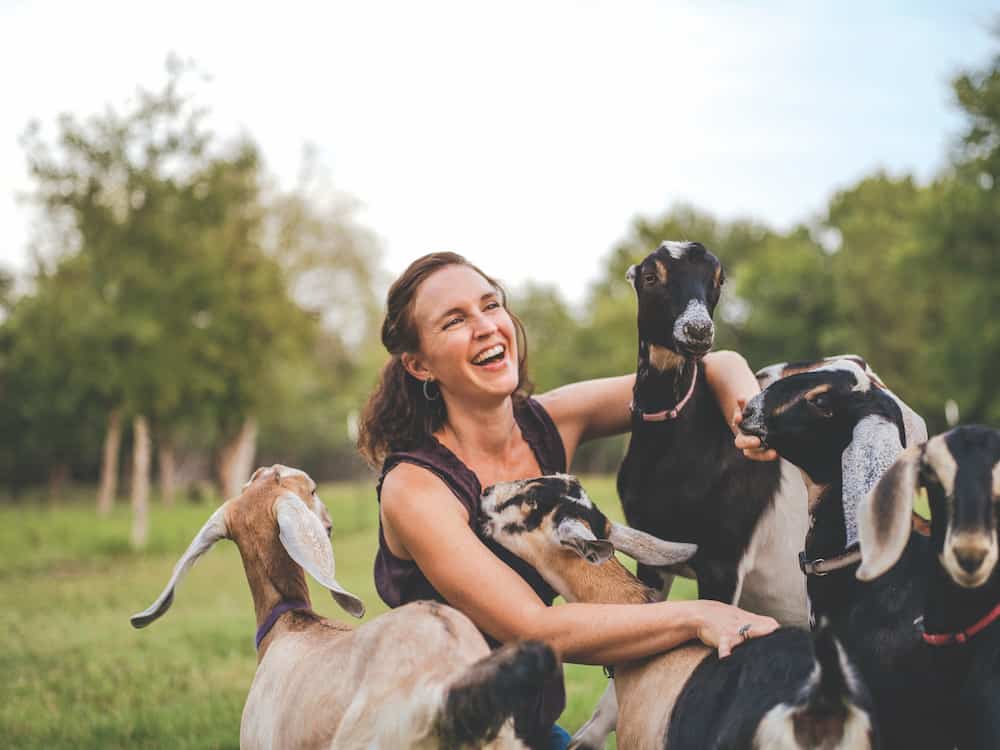
On a breezy Friday in March, I pull into Bee Tree Farm & Dairy’s oak-lined driveway. Located in Manor, Texas, 15 miles east of Austin, Bee Tree is owned by Jenna Kelly-Landes and her husband, Jeremy Crawley. Tonight, I’m one of about 50 guests here for “Cocktails and Cuddles.”
Kelly-Landes and her five dogs escort me to a pavilion, where samples of goat cheese and local beer are available. In the sun-drenched pasture nearby, guests greet the farm’s does. And while the adult goats are plenty sweet, the babies are the focus of this event.
In a covered pen adjacent to the milk parlor, 15 goat kids hold court as guests try to bottle-feed them with repurposed Topo Chico and beer bottles fitted with rubber nipples. These are just a handful of the more than 60 kids born on the farm this spring.
After giving up on feeding a gray Alpine kid far more interested in kicking chairs, I refocus on a more sedate goat, a black-and-white La Mancha named Bumblebee. I scoop her into my lap, where she promptly falls asleep. I’m instantly won over.
Kelly-Landes and Crawley own the 65-acre farm together, but the dairy is spearheaded by Kelly-Landes, with moral (read: bottle-feeding) support from Crawley. She is the head milker, cheesemaker, marketer, and distributor—a microdairy’s jill-of-all-trades. Kelly-Landes started producing cheese in 2016, almost eight years after purchasing the farm, but before she became herd queen, Kelly-Landes pursued an entirely different path, earning her master’s in economic and social policy. She was set for a high-powered consulting career, but “hindsight is 20/20,” she says. “I realize now I was suppressing my natural inclination to be with animals.”
Her path to farm life has been circuitous, somewhat rocky, and most of all, wholly unexpected.
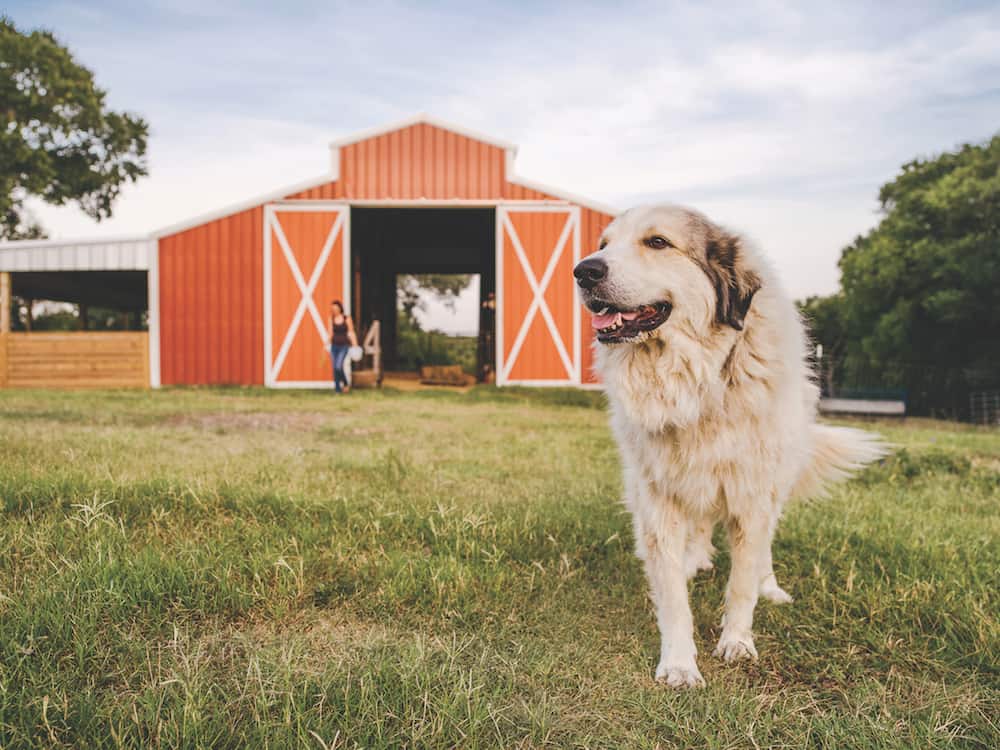
One of Kelly-Landes’ five livestock dogs watches over the farm.
An Unlikely Farmsteader
Kelly-Landes’ father, Ron Landes, is the son of Jewish-Hungarian immigrants who fled World War II; most of his extended family perished in the Holocaust. A Chicago native, he became an ER doctor and moved to San Antonio, Texas, with his wife, Kerry Kelly, a nurse. By the time Kelly-Landes was born, the family had relocated to Georgetown, a suburb of Austin.
Kelly-Landes grew up with a menagerie of pets, including two goats that were purchased as a birthday present for her older sister, Jesse. Though she adored them, agriculture never seemed a viable career option during her academic-focused upbringing.
“All my natural instincts of loving animals and wanting to spend time outside started to open up.”
After receiving a B.A. in anthropology from the University of Texas in 2002, Kelly-Landes worked at various Austin-area nonprofits before starting graduate school in 2007. Around the same time, she and Crawley, newly married, began raising chickens in their backyard and both discovered latent desires to own land outside the city. A turning point for Kelly-Landes was a trip to Austin’s Boggy Creek Farm, where she purchased goat cheese from Pure Luck Dairy. Back at home, she made herself a simple omelette with chèvre.
“That combination of eggs and goat cheese created a powerful experience,” she says. “All my natural instincts of loving animals and wanting to spend time outside started to open up. For the first time, I let myself consider [a path] that wasn’t conventional.”
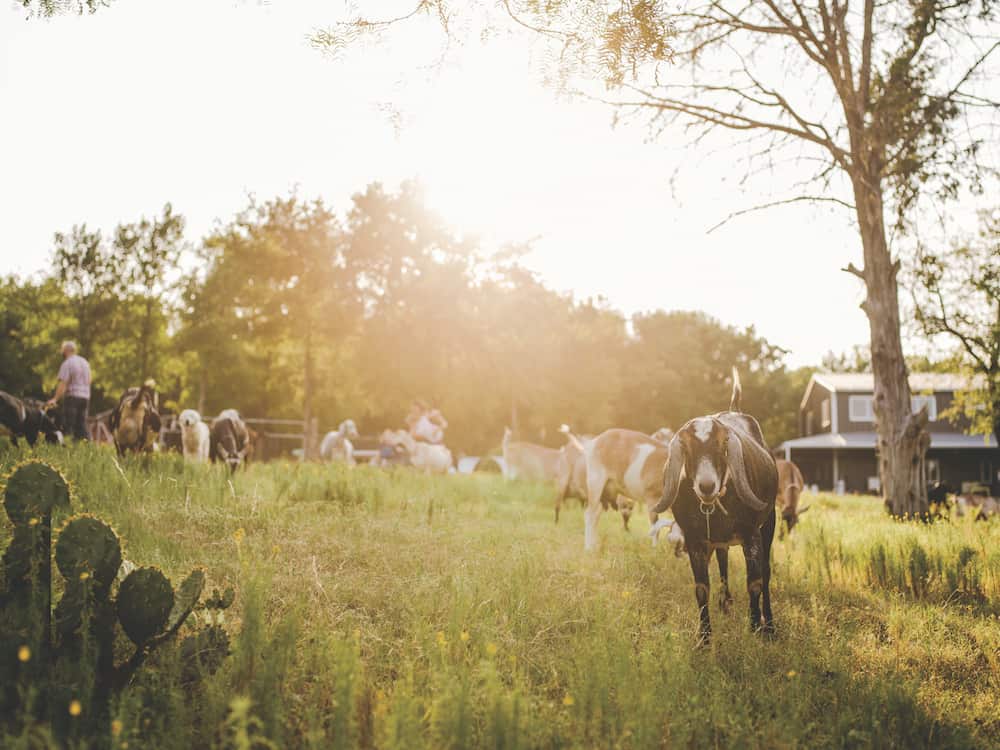
Goats in the field at Bee Tree Farm & Dairy in Manor, Texas.
Luck in the Land
Originally, the couple had a five-year plan for purchasing land. But in September 2008, property prices suddenly dropped due to the recession, and since both Crawley and Kelly-Landes did not lose their jobs, they took a chance on a property in Manor. For Kelly-Landes, who was increasingly unhappy with “schmoozing and wearing high heels,” the purchase came not a moment too soon.
Unfortunately, the previous owners of the 15-acre property had used it as a private dumping ground. There were no livable structures and it was covered in trash. “We found mattresses, a refrigerator from the 1950s, and a wheelchair from the 1930s,” Kelly-Landes says. They bought a vintage trailer to live in on weekends while clearing the land. “At 5 p.m. on Friday, we’d load our dogs into the car and wouldn’t come back until Sunday night,” she says. “We just wanted to be there. We weren’t sure what we were escaping, but we knew we were done with the city.”
Since the couple had purchased raw land, they also had to bring in utilities, digging two thousand feet of water lines themselves. Much of this manual labor took place during the 2011 drought, when fires were raging in nearby Bastrop. “We could see the smoke from Austin, and the land [in Manor] was so dry—it was truly at its most disgusting,” Kelly-Landes says. Plans to build a house there kept falling through, and the couple began to question if it made sense to continue.
During a particularly low point, they discussed selling the farm—but Kelly-Landes couldn’t shake her growing passion for homesteading and working with animals. Instead, she signed up for a goat-milking class with Kimberly Jacobi of Star Creek Country in Spicewood, Texas, on a whim. “The combination of meeting Kimberly and seeing what she was doing [with her goats] refocused my energies,” she says.
Kelly-Landes then took a cheesemaking class at nearby Pure Luck Dairy, and realized the owner, Amelia Sweethardt, was the wife of her childhood friend Ben Guyton. After making goat cheese for the first time, everything clicked for Kelly-Landes, from her bond with her childhood goats to her love for the farmland: she wanted to make this her livelihood. “Amelia immediately took me under her wing,” Kelly-Landes says, and their connection blossomed into a mentorship that still endures today. Kelly-Landes purchased her first goats from Sweethardt in March of 2012—two does, Jolene and Pearlsnaps, and a wether named Willy Boots as their companion. The barn and pasture weren’t quite ready, so she moved them onto the front porch of her recently built home. Clearly, Kelly-Landes was smitten.
“In order to do this job, you have to be adaptable, because there’s going to be something new thrown at you every single day.”
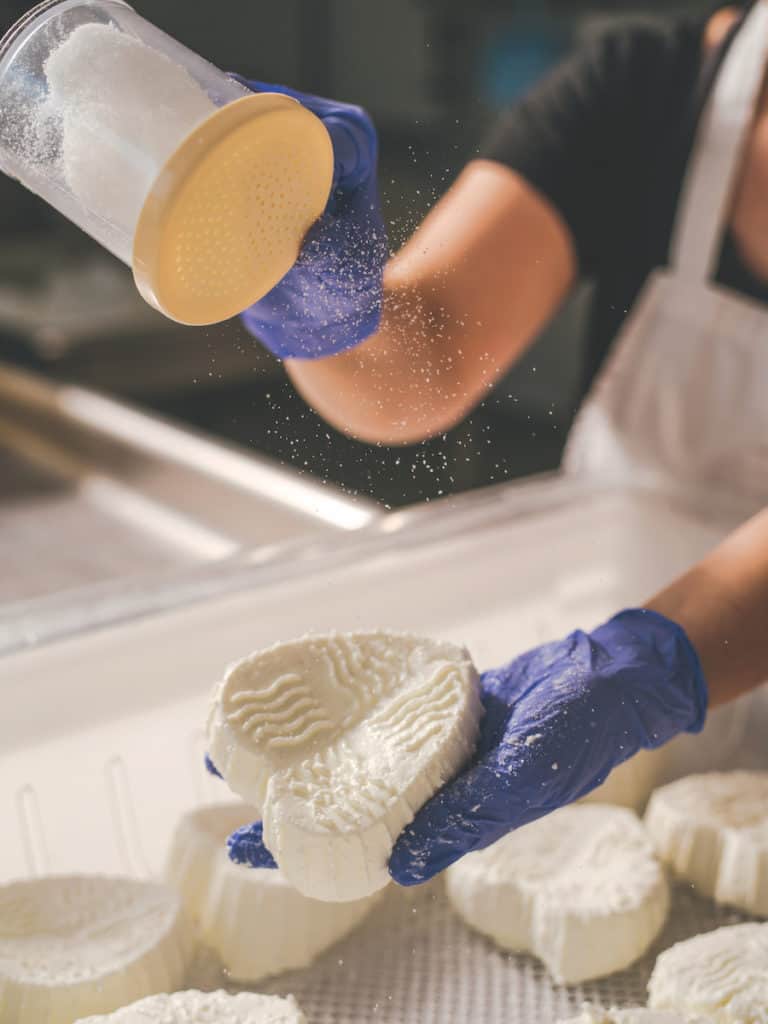
Cheesemaker Victoria Swaynos salts Mi Corazón cheese, a fresh chèvre.
Building the Dairy
Kelly-Landes left office life for good in 2014 to build a commercial dairy. Numerous mentors, including Sweethardt of Pure Luck and Frances Sharp of Sharp Goat Ranch, provided her with invaluable help during this process. On Sweethardt’s advice, she installed a milking pipeline system instead of a bucket milker so she could benefit from its scalability as she expanded her herd.
That same year, Kelly-Landes found out her IVF treatments had been successful. She was pregnant—with twins. Pregnancy and motherhood are difficult enough on their own, but Kelly-Landes found work on the farm to be a welcome distraction. Parenting also gave her a source of fulfillment during the arduous process of getting licensed to sell cheese in Texas.
“Amelia says this to me, and I try to say it to myself often: In order to do this job, you have to be adaptable, because there’s going to be something new thrown at you every single day,” Kelly-Landes says.
When she started making chèvre in 2016, Kelly-Landes realized she quickly needed to diversify. “I am in very close proximity to two of the largest, oldest, and most established goat farms in the state of Texas: Pure Luck Dairy and CKC Farms. They serve the community very well.” Kelly-Landes still produces plain chèvre, named Mi Corazón (“my heart”), as well as Diablito (“little devil”), fresh chèvre coated in a delightfully spicy mixture of honey and chipotle powder, plus feta and Besos (“kisses”), goat’s milk skyr. Recently, she’s started experimenting with goat yogurt. But her signature cheese is halloumi.
Honing in on Halloumi
Traditionally a blend of sheep’s and goat’s milk, Kelly-Landes’ version of this Cypriot cheese is made with 100 percent pasteurized goat’s milk and microbial rennet. After the curds have been hooped and pressed, the halloumi is cooked in whey, which boosts protein and makes it perfect for grilling, baking, or frying.
Currently, Kelly-Landes is the only farmstead cheesemaker in Texas who makes halloumi, and it’s been her gateway into the Austin market (she’s also the farmstead cheesemaker closest to the city). Her cheeses are on the menu at multiple restaurants, including Epicerie, and they’re available at local farmers’ markets as well as at Antonelli’s Cheese Shop, Boggy Creek Farm, and Farmhouse Delivery.
“[Working with goats] is an esoteric language that we all speak. We all rely on each other.”
The inspiration to make halloumi came from Kelly-Landes’ close friend Rachael Taylor-Tuller of Lost Peacock Creamery—another American halloumi maker, who was inspired by a recipe in Gianaclis Caldwell’s Mastering Artisan Cheesemaking (Chelsea Green Publishing, 2012). Rachael and her husband, Matthew, are based in Washington state, but she and Kelly-Landes—who have only met once—chat constantly over Facebook Messenger. The two started their dairies around the same time, sharing parallel journeys from different parts of the country.
“These relationships [with other dairy farmers] are some of the deepest friendships I have, and they’re with people who in some cases I have never seen,” Kelly-Landes says. “[Working with goats] is an esoteric language that we all speak. We all rely on each other.”
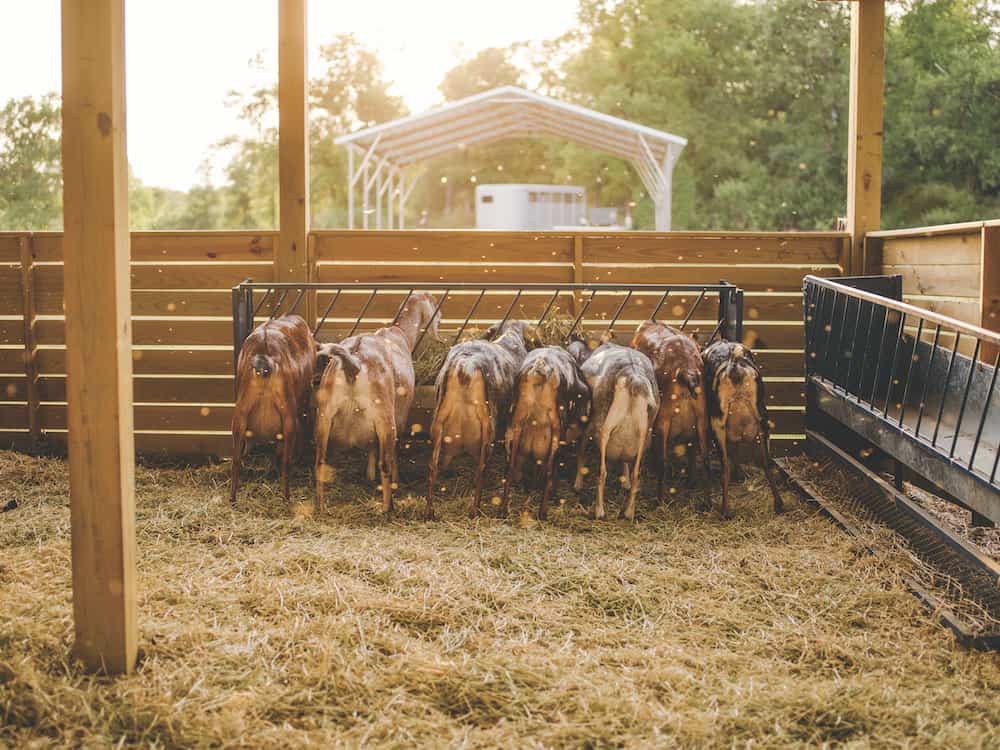
Goats at Bee Tree Farm & Dairy in Manor, Texas.
This year, Kelly-Landes will milk 26 does and produce around 100 pounds of cheese per week, with assistance from herd manager Filipa Rodrigues and a handful of part-time milkers and assistant cheesemakers. The herd of Alpines, Nubians, crosses, and recently added La Manchas now numbers 40 does and four bucks. Alfalfa is offered as feed, but the goats can also roam roughly 30 acres of the farm, where they have access to scrub brush such as mesquite leaves, cedar elm, devil’s vine, and wildflowers.
Kelly-Landes chooses not to stagger breeding, so all the goats kid February through April. “I’m only a few years in [to breeding] so it may not always work this way,” she says. “But I like not constantly worrying…I’d rather just have it over with.” A short kidding season doesn’t mean a lack of challenges, however. This year, winter brought snow, rain, and a case of the flu; two goats had pregnancy complications that resulted in death; and coyotes struck when the bucks were relocated to a new pasture.
On top of battling nature, her twins, Cora and Cormac, are now three, and Jeremy still works full time in a traditional office, so it can be difficult to strike a balance. “I’m lucky if I get to the dairy at 9:30 a.m. and have milk pasteurizing by 10,” Kelly-Landes says. “That may not be the industry standard, but small farms with young families like mine have to do this.” On the hard days, Kelly-Landes uses advice from Sweethardt as her mantra: “If it doesn’t work for the farmer, it doesn’t work for the farm.”
“I want people to hear the name of our farm and think of it as a destination [and] realize there are still wild spaces really close to Austin.”
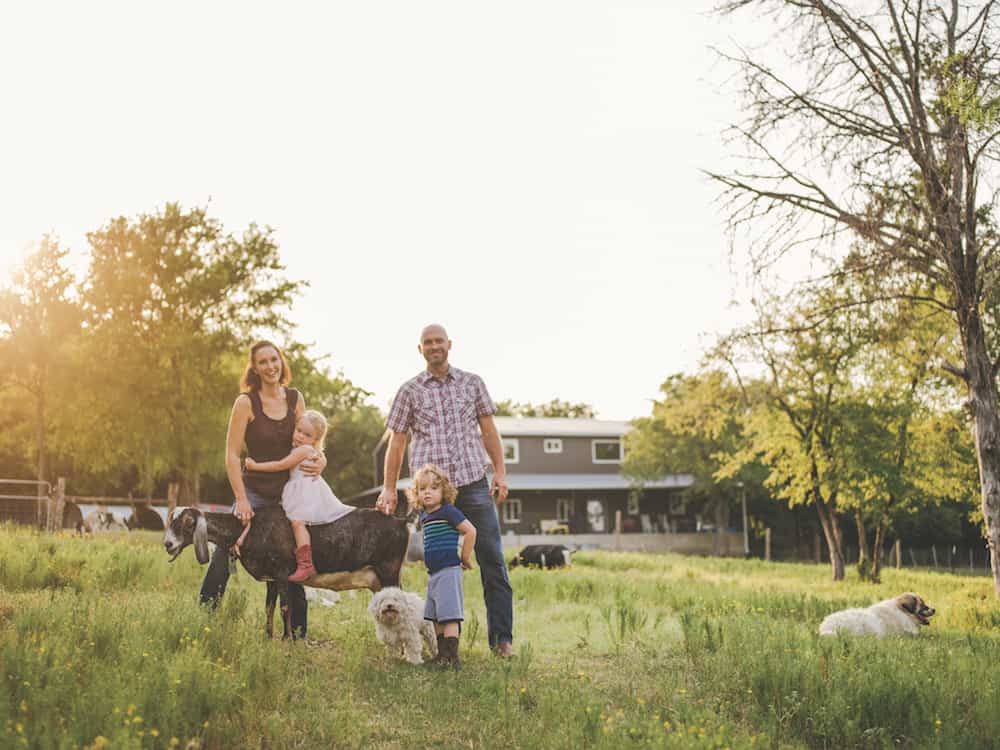
Jeremy Crawley and Jenna Kelly-Landes with their twins, Cormac and Cora.
Looking Beyond Cheese
Kelly-Landes continually brainstorms alternate revenue streams, and agritourism has become integral. “I want people to hear the name of our farm and think of it as a destination [and] realize there are still wild spaces really close to Austin,” she says.
Farm events include the aforementioned cuddle parties, classes on milking and animal husbandry, and tastings co-hosted with Antonelli’s Cheese Shop and other local businesses like Two Hives Honey and Confituras.
Kelly-Landes feels lucky to have encountered so many strong women in agriculture—and the sentiment is mutual. “What I admire about Jenna is her grit, fortitude, and honesty,” says Kendall Antonelli, co-owner of Austin’s Antonelli’s Cheese Shop. “Her [online presence] really connects consumers with the labor of love that making good cheese entails.”
Social media has helped Kelly-Landes grow her business, but she strongly believes that the response to her events goes beyond the fun of taking selfies with goats. “Most agricultural evolution happened in climates where goats thrived,” she says. “So I think humans have a very deep connection to goats that [most people are] not even aware of. It’s not just because they’re really sweet animals. They have been feeding and protecting us forever.”
And ultimately, that is why Kelly-Landes makes farmstead cheese, and why she works so tirelessly to keep her farm afloat: She has loved goats, as she says, “since the beginning.”
Header photo: Jenna Kelly-Landes of Bee Tree Farm & Dairy.
Photography by Josh Huskin/joshhuskin.com



